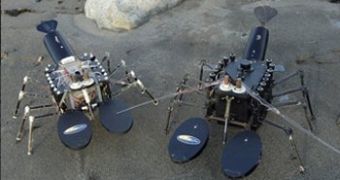Seafood appears to hold the secret for a safe space journey. A team from Harvey Mudd College (HMC) in California and the University of Louisville, collaborating with bioengineering and biomaterials company BioSTAR West, is investigating a chemical encountered in shrimp and lobster shells that could protect injured astronauts in future missions to Mars.
This research is funded by Hawaii Chitopure Inc., a Honolulu based biomaterials company that produces ultra-pure chitosan, a polymer found in the shells of crustaceans (like lobsters, crabs, and shrimp). Chitosan has recently received approval in the U.S. for use in bandages and other hemostatic (bleeding stopping) materials. Space trials will begin aboard NASA's STS-118 Space Shuttle Endeavour mission, programmed for August 7, 2007.
HMC Professor of Chemistry Shenda Baker and Professor of Engineering and Biology Elizabeth Orwin will focus on human cell responses in microgravity through a series of tests to be made during Endeavour's scheduled 11-day flight.
Professor Eugenia Wang of the University of Louisville will detect and quantify the effect of microgravity on the genes and proteins using microchip platform technology. Of maximum interest will be the effect of microgravity on human monocytes, one of the first immune cells activated in infection and trauma, and will try to asses of the role played by chitosan-based biocompatible antibacterials in controlling this response.
They will also follow the changes of cells that return from space and over time as the astronauts experience life post-space flight. A similar experiment will be made simultaneously on Earth. The space-based and ground-based cellular reactions will be compared.
"Astronauts, as well as space-flown mammalian cells, show a weakened immune response to wounds and injury. These experiments will study the effects of microgravity on wound repair and the ability of chitosan-based materials to accelerate the wound healing process, reduce infection and ultimately reduce wound scarring," said Baker.
"Because the effects of microgravity on immune and wound-healing cells are similar to the body's response following trauma on Earth, these experiments also offer an excellent opportunity to observe the fundamental genetic responses to these compounds with and without infection." she said.

 14 DAY TRIAL //
14 DAY TRIAL //